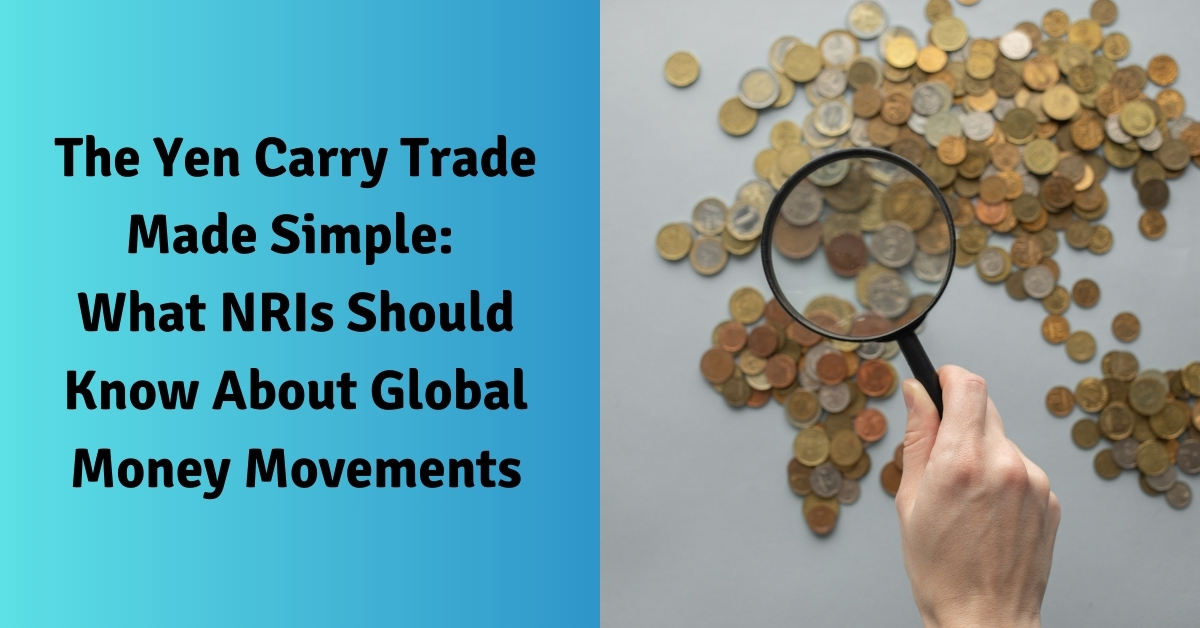The Yen Carry Trade Made Simple: What NRIs Should Know About Global Money Movements

Big changes in Japan’s money policies are shaking up stock markets worldwide. This is happening because of something called the “yen carry trade.” Let’s break down what this means and why it matters, especially if you’re an Indian living abroad (NRI).
Join our exclusive NRI-only WhatsApp Community:
https://chat.whatsapp.com/EZARhvy3JkED1TF3qjL4Jy
What’s This Yen Carry Trade Thing?
For over 30 years, Japan kept its interest rates super low – almost zero. This meant:
- People could borrow Japanese yen very cheaply
- They could then invest this money in other countries (like the U.S.) where they could earn more
Think of it like borrowing money from a friend who doesn’t charge interest, then putting that money in a savings account that pays you good interest. Plus, as the U.S. dollar got stronger against the yen, people made even more money.
What Changed Recently?
Last week, Japan did something big – they raised their interest rates for the first time in 30+ years by 0.25%. This might seem small, but it’s huge news! Now, all those people who borrowed yen cheaply need to pay interest on their loans. Many are selling their investments in other countries to pay back these loans.
The Yen Got Stronger – Why That Matters
Before this change, you could get 165 Japanese yen for 1 U.S. dollar. After the change, you only got 145 yen – that’s a 13% jump in just two days! This means people who borrowed yen now need more dollars to pay back their loans, which is causing them to sell their investments quickly.
How This Affects Money Markets Everywhere
The ripple effects are big:
- Stock Markets Dropped
U.S. stocks fell 11%, and Japanese stocks dropped 16% in one day!
- Impact on India
Japanese investors have put lots of money in India (about ₹72.05 lakh crore). When they need to pull this money out, it could affect Indian companies and markets.
What Should NRIs Do Now?
If you’re an NRI, here are three smart moves to consider:
- Watch Your Currency Risk
If you have money in dollars or other foreign currencies, think about moving some to India. The rupee might get stronger against the dollar soon.
- Look at Fixed Deposits in India
Indian banks are offering good interest rates right now. Consider putting money in NRE fixed deposits or debt funds before rates go down.
- Think About Indian Investments
While the U.S. might face tough times ahead, India’s economy looks strong. Consider moving some investments from U.S. stocks to Indian ones.
Conclusion
These big changes in Japan are causing waves in markets worldwide. For NRIs, this could be a good time to rethink where you keep your money. India’s strong economy might offer some good opportunities right now.
FAQs’
What’s the yen carry trade in simple terms?
It’s like borrowing money cheaply in Japan and investing it somewhere else where you can earn more.
2. Why do people care about this trade?
It’s been a popular way for big investors to make money, and changes to it can shake up markets worldwide.
3. Why did Japan change its rules now?
After 30 years of super-low rates, Japan needed to adjust its policies to handle rising prices.
4. How is this affecting stock markets?
People are selling stocks quickly to pay back their Japanese loans, causing markets to drop.
5. What happens when the yen gets stronger?
People who borrowed yen need more dollars or other money to pay back their loans.
6. How might this affect India?
Japanese investors might pull some of their money out of Indian companies and markets.
7. What should NRIs do about all this?
Consider moving some money to India, looking at fixed deposits, and investing in Indian markets.
8. Is this a good time to send money to India?
Yes, because the rupee might get stronger and Indian interest rates are good right now.
9. Why are NRE fixed deposits worth looking at?
They offer good interest rates and you don’t pay tax on them in India.
10. Should we worry about the U.S. economy?
Yes, there are signs it might slow down, along with other big economies, while India keeps growing.
Disclaimer: The information provided here is for educational and informational purposes only and should not be construed as financial, legal, or tax advice. Consult with a qualified professional before making any investment decisions. We do not accept any liability for errors or omissions in this information nor any direct, indirect, or consequential losses arising from its use.



